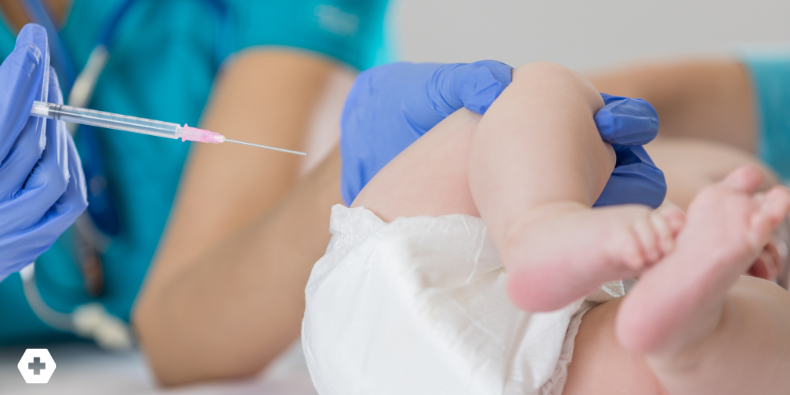
Early MMR Vaccination: Protecting Infants During the Measles Outbreaks

Measles was declared eliminated in the United States in 2000. Yet, in 2025, it’s back with force. At the time of this writing, the CDC reports outbreaks in 31 states, with 1,001 confirmed cases and two pediatric deaths—96% of those infected being either unvaccinated or have an unknown vaccination status against measles. One-third of U.S. cases this year have occurred in children under age five, including infants under 12 months.
Infants are uniquely vulnerable. They have the highest hospitalization rates and are more likely to experience serious complications from measles, such as pneumonia, encephalitis, and death. Unlike older children, they are not routinely eligible for MMR vaccination. As clinicians, we routinely help parents protect their children. But amid escalating outbreaks, are we doing enough to help them protect their children against measles?
Infants Under 12 Months are Not as Protected as We Think
In a recent Hippo blog about MMR Vaccines, we discussed the current MMR vaccination recommendations for adults and children, including booster recommendations for adults. But questions remain about how best to protect our most vulnerable population– infants under 12 months.
Maternal antibodies are often believed to protect infants against measles throughout their first year. Studies (Mathew JL et al., Leuridan E, et al., Muthiah N et al.) show that this passive immunity is short-lived—typically lasting 2-6 months after birth, with rapidly declining protection thereafter.
In countries like the U.S., where most mothers have vaccine-derived immunity, infant antibody levels tend to decline more quickly than if the mother had acquired immunity after natural infection.
A Canadian study by Science M, et al found most infants were susceptible to measles by 3 months of age, well before the standard first MMR dose at 12 months. Leuridan E, et al reported that by 6 months, 99% of infants born to vaccinated mothers and 95% of infants born to naturally-immune mothers lacked protective antibodies. These findings highlight a significant gap in measles protection during early infancy.
A Risk-Based Approach to Early MMR
In the midst of widespread U.S. measles outbreaks, protecting infants under 12 months should be a public health priority. Prior to international travel, the CDC recommends MMR vaccination for infants aged 6-11 months. However, no national guideline currently supports early vaccination for domestic outbreaks. In practice, policies vary. Some state health departments, such as in Kansas, recommend early MMR only when there is a confirmed measles case in the county of your residence or a bordering one.
Infants who receive an early MMR dose (before age 12 months) still require the standard two-dose series:
-
One dose at 12-15 months (~93% protection)
-
A second dose at 4-6 years (~97% protection).
The early dose is not counted toward the series, as immune responses before 12 months do not yield long-lasting immunity.
Some clinicians remain hesitant to offer early MMR vaccination due to concerns about immune “blunting”—that early vaccination might permanently reduce the efficacy of future MMR doses. The CDC mentions this theoretical risk in its guidance with the following statement:
“The decision to vaccinate should be made carefully after weighing the risks of the potential long-term impact of lower immune responses when infants are vaccinated less than 12 months of age (versus greater than or equal to 12 months of age) compared to the benefit of early protection when measles is circulating in the community.”
However, multiple studies (Buus S, et al, Nic Lochlainn LM, et al) have shown that early MMR vaccination does not impair long-term immunity or antibody response to later doses. In outbreak settings, early MMR vaccination can be a valuable tool to protect infants in their most vulnerable window.
Evidence for Early MMR Vaccination
A randomized controlled trial in Denmark compared the immune responses to MMR vaccines given to infants at 6 months versus the routine 15-month dose.
One month after vaccination, 49% of infants who received it at 6 months (early MMR group) achieved cellular conversion, and only 45% achieved seroprotection. While these responses were suboptimal, they were significantly higher than in the placebo group (routine 15-month MMR group)—where just 7% and 11% had evidence of seroconversion and seroprotection, respectively. The reduced immune response at 6 months was attributed to interference from maternal antibodies, which potentially prevented the infants from mounting a robust immune response to the vaccine.
Importantly, when the early MMR group received their routine dose at 15 months, they achieved 98% seroconversion—showing their immune system “caught up” and matched the robust response seen in infants who received their first dose at 15 months (95% seroconversion, 96% seroprotection). These findings confirm that:
-
Early MMR at 6 months offers partial protection during a high-risk period.
-
The routine dose at 12-15 months restores full immune response (early response is “boosted”).
-
Early vaccination with MMR does not impair long-term immunity.
Supporting this, a meta-analysis by Nic Lochlainn LM, et al confirmed that suboptimal immune responses to early MMR (before 9 months) are corrected with later doses. Gans HA, et al. reported in the 2013 MMWR Recommendations and Reports similarly found equivalent immune markers in infants vaccinated at 6, 9, or 12 months—even with passive maternal antibodies present.
In short: Early MMR vaccination for infants 6-11 months provides months of added protection without compromising long-term immunity.
Safety and Practical Implications
The MMR vaccine is safe and well-tolerated in infants under 12 months. A study from the Netherlands, conducted during the 2013-2014 measles outbreak, found fewer systemic adverse events in infants vaccinated at 6-8 months (32%) compared to those vaccinated at 9-11 months (45%) and 12-14 months (43%). Local reactions were similar across all age groups, reinforcing the vaccine’s favorable safety profile—even in younger infants.
As with other vaccines, the goal is to protect before exposure. We don’t wait for flu season to offer influenza vaccines, or for sexual debut to offer HPV vaccines. Prophylaxis is foundational in public health—and the same approach applies to measles. Measles often spreads before cases are identified. In infants, maternal antibodies against measles may have waned, leaving them vulnerable in the latter half of infancy until they can receive their routine first MMR dose.
While national guidance does not currently recommend early MMR for domestic outbreaks, a recent Opinion Paper in JAMA and a 2013 ACIP statement support a risk-based strategy during increased exposure. In the context of rising case numbers across the U.S., early MMR for infants aged 6–11 months is a safe, evidence-based intervention that can provide meaningful protection and reduce risk without compromising long-term immunity.
Practice-Changing Education
Experience education that goes beyond theory. Explore Hippo Education’s offerings below.






